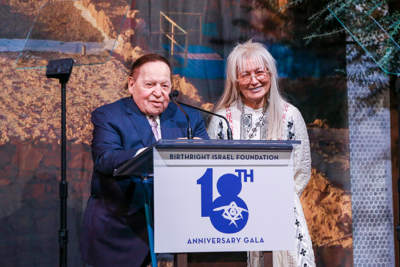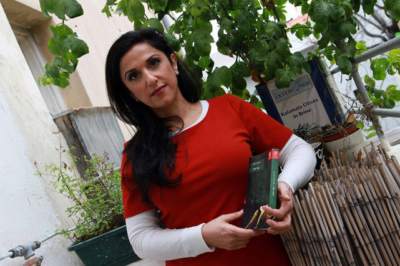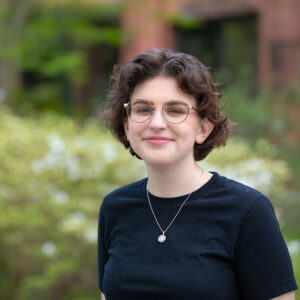This past spring, Sheldon Adelson—noted Republican donor and Birthright funder—was awarded the “Guardian of the Jewish Future” award at the annual Birthright Israel gala in New York City.
Without Birthright, he said, only 42% of Jewish kids between the ages of 18 and 26 marry other Jews or bring up their children Jewish.
“In another two or three generations there won’t be any secular Jews left. Think about that. For 3,000 years we’ve been fighting for acceptance, and now that we’ve been accepted – it’s turning around to kill us.”

For those who go on Birthright trips, that number jumps up to 72%, according to the latest Jewish Futures Project report published by the Maurice and Marilyn Cohen Center for Modern Jewish Studies at Brandeis University.
Adelson’s “Guardian of the Jewish Future” award speaks to a great anxiety within the Jewish community—the same anxiety that is reflected in the digests from major Jewish publications like the Forward and Haaretz that I get in my inbox. Every few weeks, I am greeted by an article giving a new update or opinion on something called the “intermarriage crisis.”
Jews, it seems, are worried that due to our children’s choices in romantic partners, our people will die out. We are worried about guarding our community’s collective Jewish future.
In 1990, the National Jewish Population Survey (NJPS) revealed a 52% intermarriage rate. Since then, an estimated billion dollars has been spent on “continuity crisis” initiatives, including programming—like Birthright—that encourages young Jews to meet, bond, mate with, and marry other young Jews. But after a decade of activity, the 2001 NJPS didn’t show a change in the intermarriage rate.
The Jewish Theological Seminary, which ordains rabbis for the Conservative Movement, does not permit its rabbis to perform interfaith marriages. No Orthodox rabbis do so either, and only some Reform and Reconstructionist rabbis will perform these marriages.
As the proudly Jewish daughter of a loving Jewish father and Protestant mother, all this panic leaves me wondering: what is it about my family that my community shies away from? Why is it that the increase in marriages like my parents’ has been described by some as the “Silent Holocaust”?
For many, interfaith marriage is not just a religious issue; it’s a deeply political one. In Israel, relationships across ethnic and religious lines are threatening to the status quo. There, a book called “Borderlife” has been banned from schools because it depicts a love story between an Israeli Jew and a Palestinian Muslim.

“It was banned from the high-school curriculum on the grounds that ‘intimate relations between Jews and non-Jews threaten to subvert our distinct identity,’” wrote Dorit Rabinyan, the author of “Borderlife,” in a 2017 Time magazine article.
This fear holds true outside of Israel, too.
“Just 15 percent to 20 percent of intermarried couples are synagogue members, as compared with 60 percent of inmarried couples,” wrote sociologist Stephen Cohen in a 2007 article for JTA.org. “While Jewish religious engagement is steady or rising, Jewish connections and ‘collective identity’ trends are clearly declining. While the inmarried are leading more intensive Jewish lives, the intermarried as a group remain much less engaged.”
Intermarriage, to those who share Cohen’s view, is not a path forward for an individual’s engagement in Jewish life. But, at least in the U.S., some Jewish community leaders see the growing numbers of families like mine not as a harbinger of doom, but as a sign of progress.
Rabbi Andrea Goldstein, of Congregation Shaare Emeth in St. Louis, sees the rise in interfaith families as proof of the Jewish community’s ability to adapt. The increasing number of interfaith families show the success of Jewish integration into mainstream society.
“The more intermarriage you have, the better the Jews are doing. The Jews have more freedom, they’re able to mix with everybody—all kinds of populations, in all kinds of places. There’s no more quotas…so it’s a mark of success, that’s all it is.”
Goldstein added that her willingness to perform interfaith marriages got her rejected from a few potential jobs; senior rabbis at the time simply didn’t want to hire and train someone with her beliefs.
“It seemed hypocritical to me to say the synagogue is a welcoming place for interfaith couples, and we want you to be here, and we want you to pay dues, and we want you to send your kids to religious school, and we’re going to be with you through all these important moments of your life—but not under the chuppah,” Goldstein explained. “It just didn’t seem quite right to me.”
Over the past “five to seven” years, though, things have begun to shift, Goldstein said. More and more rabbis—at least within the Reform movement—are choosing to perform interfaith marriages and to accept interfaith families as an opportunity, rather than a lost cause.
Susan Talve, one of the founding rabbis of Central Reform Congregation in St. Louis, believes that welcoming interfaith families is precisely what makes her community strong.
“If we could create a place where people felt safe raising their children in interfaith families, where no one was going to roll their eyes at them if they were going to have a Christmas tree, or make decisions for their own families…I thought that was the best thing we could do for the Jewish people,” Talve said.
If synagogues make an effort to avoid alienating interfaith families, and to instead welcome them in, interfaith families like mine might build a path forward for our communities.
While critics believe that interfaith families are threatening Jewish continuity, Talve believes that they are in fact growing the numbers of Jews in this country. She puts it simply: “Interfaith marriage might be the very thing that saves Judaism.”
Sophie Hurwitz is a student at Wellesley College majoring in history and working as news editor at the Wellesley News in her spare time. She was born and raised in St. Louis, Missouri.
Image courtesy of Pixabay.com.

